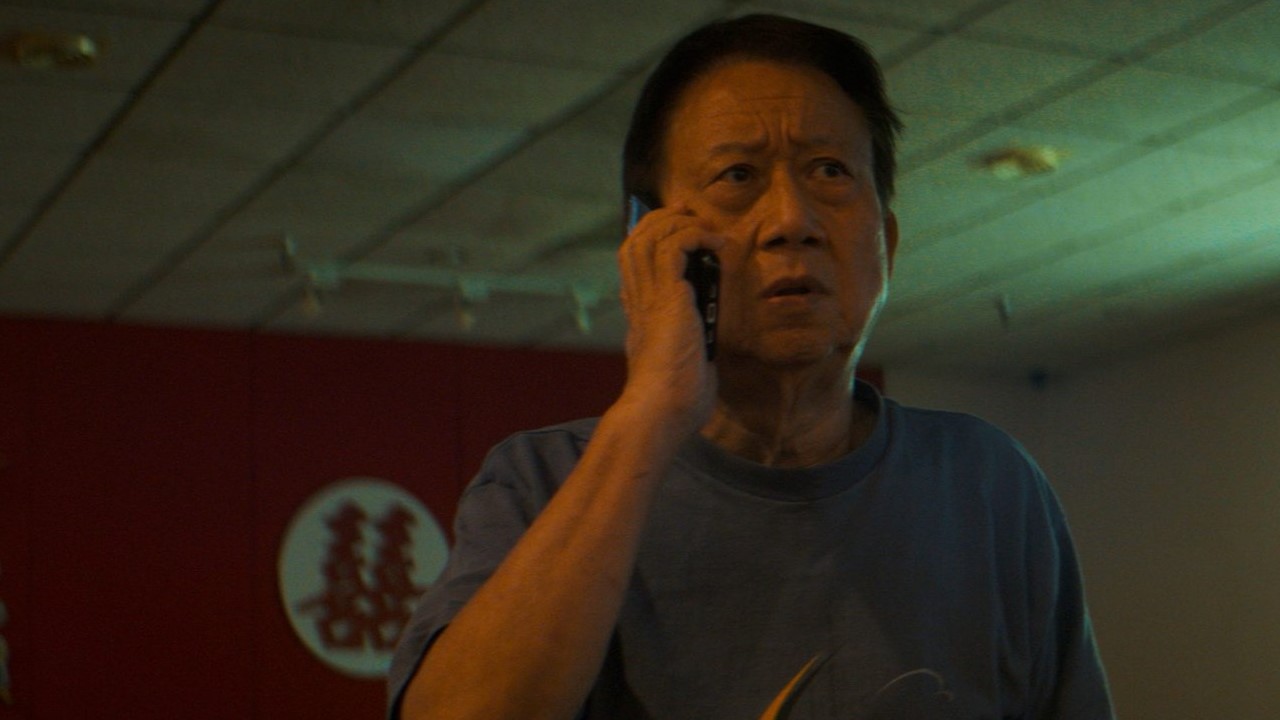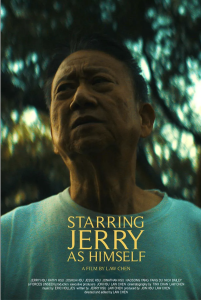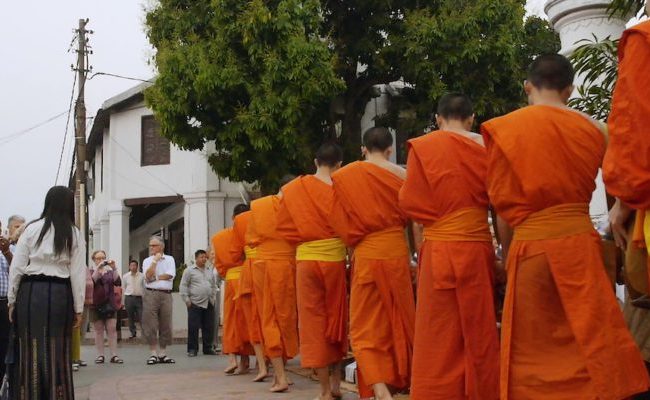A Conversation with Jonathan Hsu & Law Chen (STARRING JERRY AS HIMSELF)

Starring Jerry As Himself emerged from the “worst day” of producer Jonathan Hsu’s life, as he told director and longtime collaborator Lawrence Chen on the phone three years ago. “I found out my dad’s been working as a spy for the Chinese police,” Hsu told Chen, although both men had their doubts.
Between their awe and suspicion, the genre-bending, fact-versus-fiction pseudo-documentary, Starring Jerry as Himself, was born. The film investigates the months during which Hsu’s father, Jerry became a spy for the Chinese police to clear his name from a $1.28 million laundering scheme. Throughout these months, Jerry lived the life he admired on movie screens – full of action, suspense, and unbridled thrill. But it was, as most things are, too good to be true.
In a conversation with Jonathan Hsu and Chen, edited for length and clarity, the two creators share the reality beneath Jerry’s larger-than-life misadventure.
Hammer to Nail: In the film, Jerry sits the entire Hsu family down, timidly admitting he’s played a top-secret role in an international conspiracy. There are gasps, there’s yelling – it’s all very dramatic. But this film blends truth and fiction, so Jonathan, how did your father initially break the news?
Jonathan Hsu: In 2021, I get a phone call one day that something horrible happened to my father. I sat with it for a week and one of the first people I told about what happened was my close creative collaborator, Law Chen. I tell him this crazy story and he’s like, “I don’t know if I believe this but I feel like there’s a movie here. Let’s go investigate.”
Law Chen: So we go down to Florida, where Jerry has retired. I set up a camera and we begin interviewing him. Jerry weaves us this fantastical tale of being an agent in a money laundering investigation and he’d taken surveillance photos of his local Chase Bank in Orlando and wore a wire-tap for the Chinese government to listen to bank tellers. And he’s keeping it all secret from his family this entire time. And that’s when we were like, there is a story here – how do we go tell it?
HtN: So, how did you initially go about telling the story? Did this process evolve?
LC: We spent about a year writing a script, pitching around Hollywood, and finding Hollywood actors who are over the age of 70 who speak Chinese that are working to see if they’d be in the movie. But there just aren’t that many actors out there. Then as we were interviewing Jerry, I was like, wow, this guy’s really good in front of a camera. There’s something about him – a magic that he has where he forgets we’re there and he’s just purely himself. So we asked him, “How would you like to play yourself in the movie?” And he said, “Yes, but only if it’s a spy movie.”
So, we made a half documentary, half spy film. But it’s ultimately about an immigrant searching for the American Dream. I went in thinking the film would end in a completely different way, but ultimately it became about Jerry rediscovering himself.
HtN: How did you think the film would end?
LC: Well, there’s the main plot that’s happening, but there’s always that love story. The story might end in trauma and tragedy, but at the end, he and his wife fall in love again. And it’s this poignant Hollywood love story where they’ve separated and now they’re back together. And then we interviewed Kathy [Jerry’s ex-wife] and she was like, “Nope, not happening.”
HtN: In some ways, the film still ends with that poignant love story. Maybe it’s not romantic, or between Kathy and Jerry specifically, but there’s definitely love rekindled within the Hsu family.
LC: The film was really about the family coming together for Jerry. We want everybody who watches this to immediately call their parents when the film ends,
HtN: I’m curious about the writing process for this film. While covering the truth, you also touch upon the unreliability of perspective and memory? How did you balance the truth with Jerry’s imagined reality?
LC: I came in as an outside observer into the deepest, darkest secret of this Asian American family (and I bring up Asian American because these are things that are never divulged to the public).
Writing this was basically us making two films at once. One was the spy film of everything that happened, and that was almost the easier part because there was a script. But this is a film within a film. The spy film is in between this documentary sandwich. We didn’t know what was going to happen, we didn’t know the fallout would be, so we kind of just left that completely open. It’s the moments when we’ve called cut but we’re still rolling, and you see into who this person really is and how they’re picking of the pieces of their life after something like this has happened. We had to choose a fun, creative format to tell a story that nobody seems to care about. To tell the story in a fun, exciting, new, different way to make you really sit down and be like, “Oh my God, that’s my dad.”
HtN: The documentary aspect of the film is clear through the interviews with Jerry, looking on his situation in retrospect, but I noticed the aspect ratio changes depending on the level of truth being told. Law, what other techniques did you employ to cut through the reality and establish the “spy film” aspect of the project?
LC: Yeah, the wider screen it is, the more fictional it is. 4:3 VHS is the most honest truth can be – it is archival footage, it is what Jerry was like 30 years ago. And then 16:9 is your traditional documentary, which is us, the director giving the subject some direction or just observing. Then, ultimately, when it transitions to anamorphic, that is your full-on spy thriller experience.

We did a lot of magical realism. We brought the police officers into the room with Jerry because, at first they were just all on the phone and that would not be fun to watch. But it also brought us into Jerry’s psyche. He had become so close with them – friends with them. It also speaks to why Jerry is perceiving things from a surreal way, which the Alzheimer’s diagnosis at the end does a lot of explaining.
HtN: By the end of the film, it’s also revealed Jerry has always dreamed of being an actor and filmmaker. Jonathan, how did you originally discover this about your father?
JH: Law and I were on set when [Jerry] told us this truth that he’s always been inclined to tell stories. In total hindsight, I can see back into my childhood that he loves movies. Friday night we would go to Blockbuster and rent three movies or just binge watch whatever’s on TV. I guess he just always buried it inside of him and it was in the course of making this he really got to play and see what it was like to be on set and he was like, “This is what I dreamed of.”
LC: He had come to America in the 70s with dreams of being an actor and writer, but he gave that all up to raise a family. Despite all the things that happened, the silver lining is that he gets that little slice of the American Dream back.
JH: At the Slamdance premiere, people stood up for a standing ovation, chanting “Jerry! Jerry! Jerry!”. I think my dad was weeping; he was just taking it in, watching people appreciate the movie.
HtN: In an especially tender scene, Kathy says making the film “saved” Jerry. How did you notice this, if at all?
LC: There were two parts of the making for Jerry that really helped him. It was a bit of a risk whether this was going to be a therapeutic, cathartic process for him. We asked him, “Hey, do you want to do this? This is what it entails and it’s recreating everything that happened.” And he was like, “Let’s do it.”
It was this interesting psychological study from my perspective and John’s perspective, watching him step out of his own body, play himself, and observe all of the events that happened. It felt like, in this specific case, he got to come to terms with everything.
JH: In the making of this film, we changed the narrative. He would still be delivering DoorDash if Law and I stepped in and said, “Hey, let’s make a movie.” He gets to change the memory of the incident into a good memory. I do believe that film can be very therapeutic. I think the experience gave Jerry a purpose and a message to tell the world, and that’s why we made the film.
Starring Jerry as Himself open theatrically on Nov. 6 at New York City’s IFC Center, and will launch on V.O.D on Nov. 8.
– Kaitlyn Hardy











